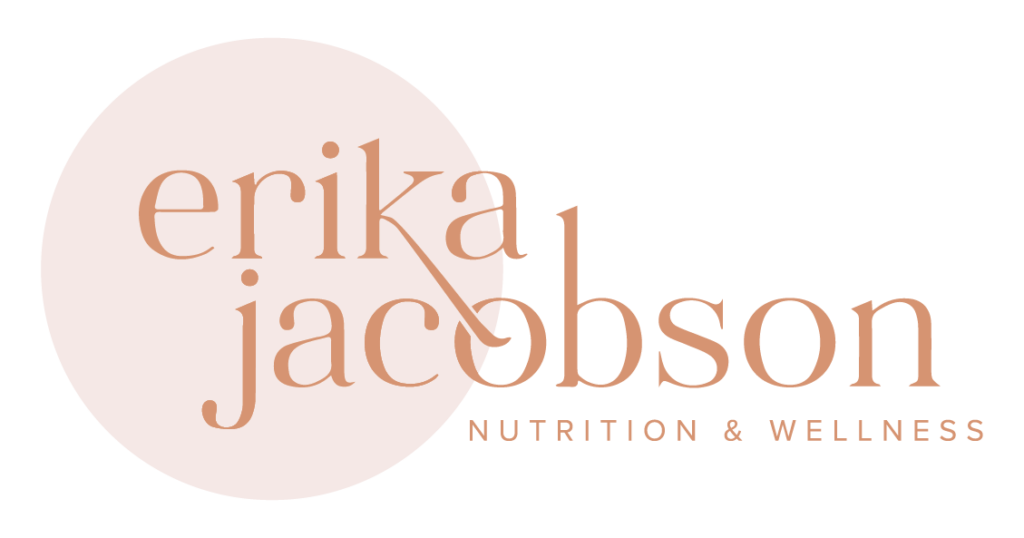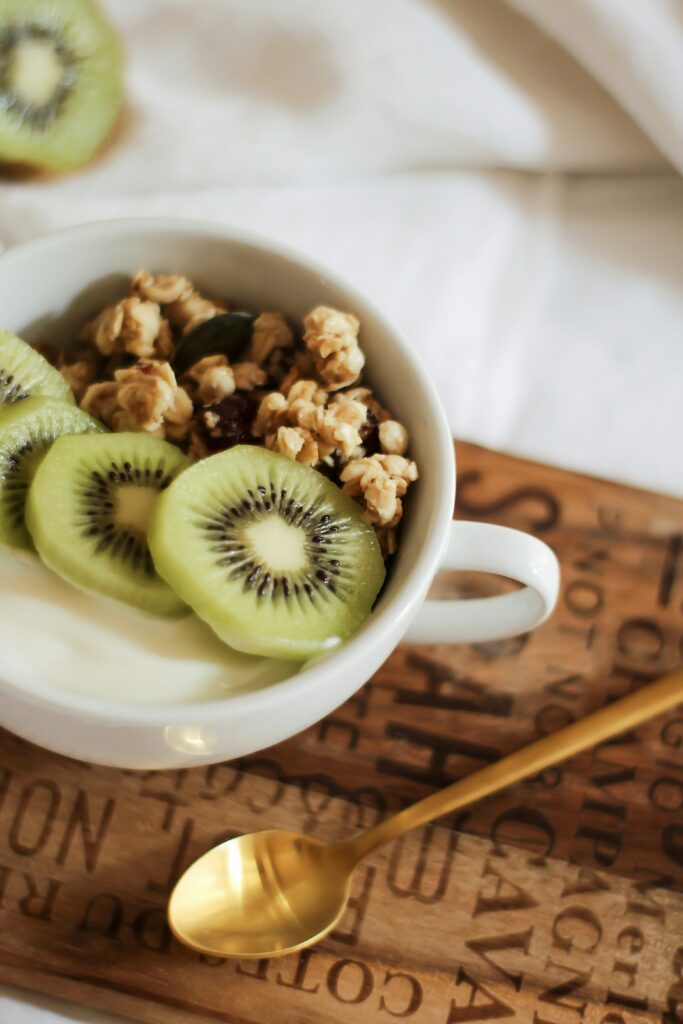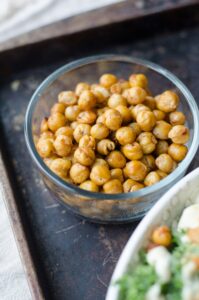As a functional gut health dietitian, I’ve worked with many clients who were suffering from chronic constipation or diarrhea and helped them heal their poop problems using nutrition, lifestyle and targeted supplementation. If you’ve been struggling with constipation or diarrhea, effective relief may be closer than you think, right in your own kitchen! In this blog post, I’ll share my top foods that can help alleviate constipation and diarrhea. From fiber-rich vegetables to probiotic-packed yogurt, these natural foods are gentle, nourishing options to support your digestive health.
Top Foods for Constipation
Kiwi: Eating two kiwis daily including the skin, where most of the fiber resides, can improve stool consistency and frequency. Enjoy them as part of breakfast or as an afternoon snack with nuts.
Beans (Kidney beans, Navy beans, Pinto beans, Lima beans): Gradually incorporate beans into your diet to boost soluble and insoluble fiber intake. The key with beans is to start low and go slow to build up tolerance. Also, soaking beans before cooking them makes them easier to digest. Enjoy them in taco salad, bean dip, and more!
Potassium-Rich Foods: Foods high in potassium, like potatoes, oranges, avocados, and root veggies are great for constipation because they help with gut muscle contractions, improving gut motility. Enjoy them throughout the day in salads, soups, roasted veggies or fruit as a snack.
Flaxseeds and Chia Seeds: These seeds boost fiber intake to soften stools and normalize bowel movements. Start with small amounts and gradually increase your intake. Add them to yogurt bowls or salads, or blend them into smoothies.
Blueberries, Strawberries, Raspberries, Blackberries: Berries are rich in polyphenols and fibers that promote regular bowel movements. Boost your berry intake by adding them to smoothies, yogurt bowls, and desserts or as a snack.
Nuts: Nuts are not only a healthy fat but also a good source of fiber. Trail mix is a convenient on-the-go snack, or you can top yogurt, smoothies, and oatmeal with nuts.
Ginger: Incorporating ginger into your diet improves gastric motility and emptying, benefiting constipation. Add ginger to recipes or drink ginger tea.
Hydration: Proper hydration and fiber intake work together for a healthy gut. Drinking enough water when increasing fiber intake is essential to avoid worsening constipation. A simple trick to determine your daily water needs is to divide your body weight by two. For example, 150 lb = 75 oz of water per day).
Top Foods For Diarrhea
Yogurt: Rich in beneficial probiotics, yogurt can help to prevent and alleviate diarrhea. Get creative with yogurt by incorporating it into smoothies, as a base for a nourishing breakfast bowl or in baked goods! If dairy doesn’t work for you, plenty of dairy-free options exist.
Oats, Beans, Chia Seeds: These are excellent sources of soluble fibers that help to firm up stools and alleviate diarrhea. Enjoy overnight oats and chia pudding, or add beans to soups.
Pectin: Bananas and cooked apples are packed with pectin, another soluble fiber that aids in firming loose bowel movements. Try bananas in smoothies and stewed apples.
Peppermint Tea: Soothe your gut with the power of peppermint. This incredible herb acts as a muscle relaxant for your gastrointestinal tract, aiding in smoother digestion.
Bone Broth: Replace lost minerals and fluids while nourishing your gut with bone broth. It provides protein and collagen, promoting the health of your gut lining.
Cooked veggies: A large raw salad is tough on digestion. Cooking helps break down fibers, making them easier to digest. If you have a sensitive gut, try sticking to mostly cooked veggies or adding veggies to soups with a nourishing broth.
Final Thoughts
Adding these gut-supportive foods to your diet can make a huge difference in improving constipation and diarrhea. Our bodies are unique, so what works for one person may not work for another. Don’t be afraid to try different foods and see how they affect your digestive system. But sometimes, we need to go deeper and address the root cause of chronic gut issues for long-term relief. And if you’re still struggling, I’m here to help!
Book a free clarity call today, and together we can create a personalized plan to overcome your poop problems once and for all!
- Lipski, Elizabeth. Digestive Wellness: Strengthen the Immune System and Prevent Disease through Healthy Digestion. McGraw-Hill, 2020.
- Chiarioni, G., Popa, S. L., Ismaiel, A., Pop, C., Dumitrascu, D. I., Brata, V. D., Duse, T. A., Incze, V., & Surdea-Blaga, T. (2023). The Effect of Polyphenols, Minerals, Fibers, and Fruits on Irritable Bowel Syndrome: A Systematic Review. Nutrients, 15(18), 4070. https://doi.org/10.3390/nu15184070
- UCSF Health. (2023, May 8). Constipation. ucsfhealth.org. https://www.ucsfhealth.org/education/constipation#:~:text=Foods%20that%20are%20good%20sources,%2C%20wheat%20bran%2C%20and%20legumes
- Davidson, K. (2022, January 25). Symptoms of low potassium (hypokalemia). Healthline. https://www.healthline.com/nutrition/potassium-deficiency-symptoms#:~:text=With%20low%20potassium%20levels%2C%20contractions,most%20associated%20with%20severe%20hypokalemia
- Wang, X., Qi, Y., & Zheng, H. (2022). Dietary Polyphenol, Gut Microbiota, and Health Benefits. Antioxidants, 11(6), 1212. https://doi.org/10.3390/antiox11061212
- Hu, M.-L., Rayner, C. K., Wu, K.-L., Chuah, S.-K., Tai, W.-C., Chou, Y.-P., Chiu, Y.-C., Chiu, K.-W., & Hu, T.-H. (2011). Effect of ginger on gastric motility and symptoms of functional dyspepsia. World Journal of Gastroenterology, 17(1), 105–110. https://doi.org/10.3748/wjg.v17.i1.105
- Contributors, W. E. (n.d.). Mint Tea: Health Benefits, Nutrition Facts, and How to Prepare It. WebMD. https://www.webmd.com/diet/mint-tea-health-benefits




